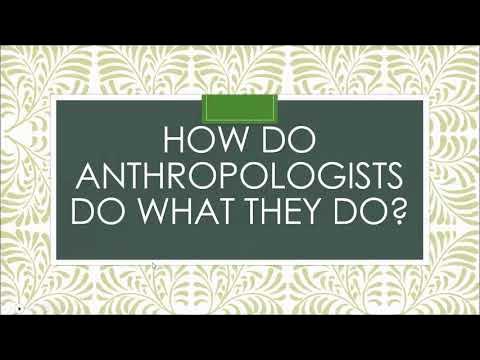Tim Ingold - Por que precisamos de Antropologia?
Summary
TLDRTim Ingold, Emeritus Professor of Social Anthropology at the University of Aberdeen, shares his vision of anthropology as a generous, open-ended, comparative, and critical inquiry into human life. He emphasizes that anthropology listens to diverse ways of living, learning from them without imposing solutions. Anthropology's task is to find sustainable ways of living for future generations, addressing humanity's collective ethical question of how we should live. Ingold stresses the importance of studying with people, valuing their wisdom, and working together to forge a better future for all beings on Earth.
Takeaways
- 😀 Anthropology is a generous, open-ended, comparative, and critical inquiry into human life and its possibilities.
- 😀 Anthropology is generous in that it involves listening to and learning from others, valuing their wisdom and experiences.
- 😀 The field is open-ended, meaning it doesn’t seek final solutions but focuses on sustainability and ongoing ways of living.
- 😀 Anthropology is comparative, recognizing that all ways of life are experiments in how humans can live together on Earth.
- 😀 Anthropology acknowledges that no single way of life is superior to another, and it strives to learn from all different ways of living.
- 😀 The critical nature of anthropology means questioning and challenging the systems of production, governance, and control that have caused harm to humanity.
- 😀 Anthropology aims to address the collective question of how humanity should live sustainably, for the benefit of future generations.
- 😀 The task of anthropology is to help forge a world that ensures life and prosperity for all beings, human and non-human, in the future.
- 😀 We need to work together globally, drawing from the wisdom of diverse cultures and experiences to find solutions for sustainable living.
- 😀 Anthropology is unique among academic disciplines because it doesn’t treat people as objects of study but studies with them to learn from their accumulated knowledge.
- 😀 In contrast to other social sciences, anthropology listens to people not just as data points, but as equals, to collaboratively search for solutions to global challenges.
Q & A
What is the definition of anthropology according to Tim Ingold?
-Tim Ingold defines anthropology as a generous, open-ended, comparative, and critical inquiry into the conditions and possibilities of human life in the one world we all inhabit.
Why does Ingold describe anthropology as 'generous'?
-Ingold describes anthropology as 'generous' because anthropologists listen and respond to what others are telling them, accepting and learning from the wisdom of other people, and giving back in return.
What does 'open-ended' mean in the context of anthropology?
-'Open-ended' means that anthropology does not seek final solutions to the problems of life. Instead, it looks for ways to sustain life in different forms, without assuming a definitive balance or endpoint.
How does anthropology approach 'comparative' analysis?
-Anthropology is comparative in that it recognizes every way of living as an experiment in how humans can live their lives in the world, learning from the differences and successes of various ways of life.
Why is anthropology considered 'critical'?
-Anthropology is critical because it does not accept the world as it is. Ingold points out that modern systems of production, governance, and control have led the world to the brink of disaster, so anthropology seeks to move beyond these systems.
What is the collective task that anthropology seeks to address?
-The collective task is to address the ethical question of how humanity should live in the world so that future generations, both human and non-human, can have life and prosperity.
Why does Ingold argue that nobody has the answers to how to live?
-Ingold argues that no single science, philosophy, or group already has the answers to how to live because the world is complex and requires collective effort. Finding solutions is a process that must involve everyone.
How does anthropology differ from other academic disciplines in its approach to studying people?
-Anthropology differs in that it does not study people as objects for analysis. Instead, it studies with people, learning from their accumulated wisdom, and seeking to understand their experiences and traditions in a collaborative manner.
What does Ingold mean by sustainability in anthropology?
-Ingold refers to sustainability not as achieving a final balance, but as the ability to carry on life in a way that is viable both presently and in the future, taking into account various ways of living and their long-term impacts.
What makes anthropology unique among academic disciplines?
-Anthropology is unique because it listens to and takes seriously the knowledge and wisdom of people from all backgrounds, including those who have developed insights over generations, and involves a shared effort to find solutions for future generations.
Outlines

This section is available to paid users only. Please upgrade to access this part.
Upgrade NowMindmap

This section is available to paid users only. Please upgrade to access this part.
Upgrade NowKeywords

This section is available to paid users only. Please upgrade to access this part.
Upgrade NowHighlights

This section is available to paid users only. Please upgrade to access this part.
Upgrade NowTranscripts

This section is available to paid users only. Please upgrade to access this part.
Upgrade NowBrowse More Related Video

What Is Political Anthropology? Political Behavior, Maintaining Social Order, Political Science

Metode dan Etika Penelitian Antropologi Etnografi (1)

Berkenalan dengan Arkeologi - Humanities, Explained

Edmund Leach: Desmistificando as Mágicas Sociais da Sociedade

Who Is Franz Boas? Cultural Relativism, Scientific Racism, Anthropology, Four Field Approach & More!

Understanding the Self - Anthropology
5.0 / 5 (0 votes)